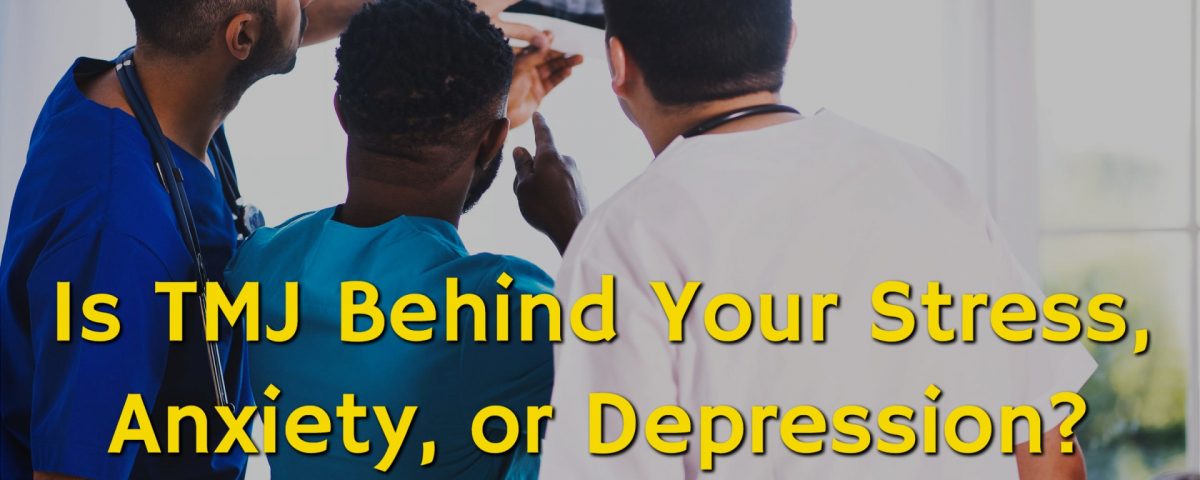TMJ’s Connection with Stress, Anxiety and Depression

How Your CPAP May be Affecting Your Teeth
December 10, 2019
The Hidden Eye Danger of Sleep Apnea
December 31, 2019Jaw and face pain are excruciating. It is even worse when you don’t know what’s causing the pain. For many of us, facial and jaw pain is related to the temporomandibular joint. This is a hinge-like joint that connects your upper and lower jaw bones. This pain usually doesn’t resolve by itself. However, with the help of a TMJ dentist you may be able to find relief.
What is TMJ?
This complex joint is made up of a different muscles, ligaments, discs, and bones. They work together to move your jaw forward, backward, and side to side. When anything goes wrong in your jaw joint, you can experience pain and difficulty moving your jaw. Anytime this joint isn’t working properly, it could mean you’re having symptoms of temporomandibular joint disorder, or TMJ. TMJ disorders affect the muscles and joints that connect your lower jaw to the skull. There are many causes of TMJ such as Dental issues, including bite misalignment, joint alignment issues or muscle strain , an Injury to the head or neck, degenerative condition and chronic stress or tension.
To understand TMJ let’s look at a list of symptoms so that you know what to look for:
- Pain or tenderness in your jaw joint
- Pain in your neck or shoulders
- Tired feeling or pain in your face
- Swelling on the side of your face
- Pain in or around your ear
- Pain while chewing or an uncomfortable bite
- Toothaches
- Headaches
- Dizziness
- Hearing problems or ringing in the ears (tinnitus)
- Locked jaw, which makes it difficult to open or close your mouth
- Clicking or grating sensation when opening and closing your mouth
Cognitive and Psychological Difficulties:
If your jaw, neck, and skull are not properly aligned, the blood flow and fluid movement between your head and body slows down. It can cause “brain fog,” a state of mental confusion and difficulty focusing. TMJ syndrome patients were found to score poorly on cognitive tests and used different regions of the brain than normal to complete tasks.
Pain, especially chronic pain, is an emotional condition as well as a physical sensation. It is a complex experience that affects thought, mood, and behavior. Pain is chronic if, in general, it lasts longer than three months. This means it extends beyond the usual healing time for an illness or injury. Chronic pain can cause trouble with thinking, memory, and even cause depression, anxiety or other mood disorders. Why are people with TMJ at risk for developing anxiety disorders and depression? It may be caused by the type of pain and discomfort a person is feeling. Chronic pain causes changes in the brain and often goes hand in hand with anxiety and depression. Also, TMJ may cause an array of symptoms that can trigger anxiety and depression such as such as severe pain, tinnitus, dizziness, headaches, cluster migraines, and other neurological symptoms.
Anxiety and Depression
Previous research has indicated a link between anxiety, depression and TMJ pain. An article in American Pain Society pointed to evidence that there is a moderate to strong link between depression and anxiety symptoms and TMJ pain. Another study that included more than 4,000 patients who all underwent medical and oral health examinations, TMJ pain assessments and completed a psychiatric risk factor questionnaire. In this study , the researchers found that depressive symptoms were more strongly related to TMJ pain than to muscle pain, while anxiety symptoms were linked with muscle pain.
It is also important to note that according to researchers, TMJ pain may be a physical symptom of depression or anxiety. They explained that these mental health conditions could lead to increased activity in the jaw muscles and that may lead to inflammation and pain.
People with this disorder are also at risk of experiencing panic attacks. Panic attacks are an anxiety symptom that is often triggered by periodic and uncomfortable physical sensations. So, those with TMJ disorder that experience inexplicable dizziness and other symptoms may develop panic attacks.
Wondering if you are experiencing anxiety and/or depression? Symptoms of anxiety and depression include:
- Teeth grinding or bruxism
- Muscle tension or pain
- Constantly feeling weak or tired
- Lack of motivation and energy
- Trouble falling asleep/staying asleep
- Loss of interest in hobbies or daily activities
- Feelings of stress, worry, sadness or hopelessness
- Changes in appetite, mood swings or restless behavior
How to Control TMJ-Related Anxiety
If you are suffering from chronic pain, anxiety and depression, it is time to call qualified professionals to help you. Research and studies show that the more you can control your TMJ symptoms, the easier it will be to control and eradicate your anxiety. The experts agree that TMJ disorder contributes to anxiety, anxiety isn’t exactly caused by the disease. Rather, anxiety is a secondary symptom that comes from living with TMJ disorder, and often is already present in those that develop TMJ. The disease simply makes anxiety symptoms worse. It’s important, then, to treat both the TMJ disorder and your underlying anxiety by contacting your primary care physician and a qualified dentist.
How to Diagnose and Treat TMJ
When you visit a TMJ dentist, they will examine your jaw, the joint and surrounding muscles to identify pain. They will also listen for sounds during movement of the joint. X-rays are not usually needed unless the doctor suspects an underlying issue such as arthritis, which could be affecting your jaw. The dentist will make a diagnosis and create a care plan for you. There are some at home remedies that can treat mild TMJ, but more severe cases will need in office treatment and further consultations.

